Filter by
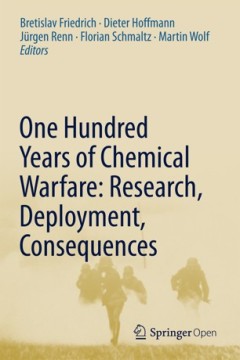
One hundred years of chemical warfare: research, deployment, consequences
On April 22, 1915, the German military released 150 tons of chlorine gas at Ypres, Belgium. Carried by a long-awaited wind, the chlorine cloud passed within a few minutes through the British and French trenches, leaving behind at least 1,000 dead and 4,000 injured. This chemical attack, which amounted to the first use of a weapon of mass destruction, marks a turning point in world history. The …
- Edition
- -
- ISBN/ISSN
- 9783319516646
- Collation
- xi, 408p. : ill.
- Series Title
- -
- Call Number
- 355 ONE o
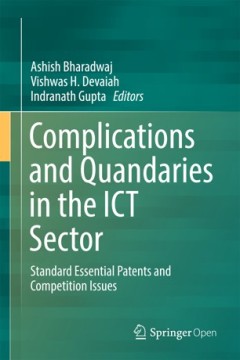
Complications and quandaries in the ICT sector : standard essential patents a…
With technology standards becoming increasingly common, particularly in the information and communications technology (ICT) sector, the complexities and contradictions at the interface of intellectual property law and competition law have emerged strongly. This book talks about how the regulatory agencies and courts in the United States, European Union and India are dealing with the rising alle…
- Edition
- -
- ISBN/ISSN
- 9789811060113
- Collation
- xxiv, 200p. : ill.
- Series Title
- -
- Call Number
- 343.099 COM c
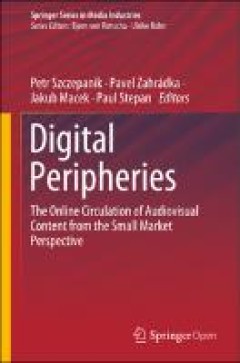
Digital peripheries : the online circulation of audiovisual content from the …
This is an open access book. Media industry research and EU policymaking are predominantly tailored to large (and, in the latter case, Western) European markets. This open access book addresses the specific qualities of smaller media markets, highlighting their vulnerability to global digital competition and outlining survival strategies for them. New online distribution models and new trends i…
- Edition
- -
- ISBN/ISSN
- 9783030448509
- Collation
- XI, 302 p.
- Series Title
- Springer Series in Media Industries
- Call Number
- 302.231 DIG d
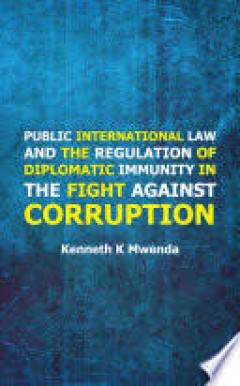
Public international law and the regulation of diplomatic immunity in the fig…
At times, the book reads like a political thriller as, for example, when Prof Mwenda writes about diplomats who disregard traffic laws and fail topay fines. There is apparently a correlation between recalcitrant diplomatsand their countries’ standing on corruption perception indices. This iscertainly the case with respect to African diplomats. Those diplomats fromcountries perceived to be th…
- Edition
- -
- ISBN/ISSN
- 9780986985799
- Collation
- x, 218 pages ; 25 cm.
- Series Title
- -
- Call Number
- 340 MWE p
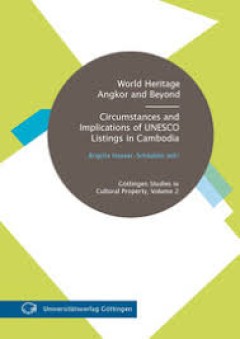
World heritage angkor and beyond - circumstances and Im
Angkor, the temple and palace complex of the ancient Khmer capital in Cambodia is one of the world’s most famous monuments. Hundreds of thousands of tourists from all over the globe visit Angkor Park, one of the finest UNESCO World Heritage Sites, every year. Since its UNESCO listing in 1992, the Angkor region has experienced an overwhelming mushrooming of hotels and restaurants; the infrastr…
- Edition
- -
- ISBN/ISSN
- 9783863950323
- Collation
- -
- Series Title
- -
- Call Number
- 300 BRI w
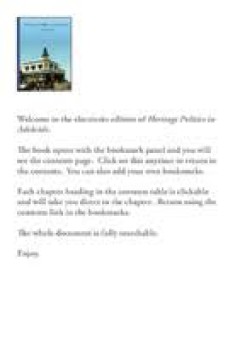
Heritage politics in Adelaide
In the 1970s the Australian Commonwealth Government and three States, Victoria (1974), New South Wales (1977) and South Australia (1978), passed legislation to protect the built heritage within their jurisdictions. The legislation was primarily a response to two factors: a large number of public protests against the demolition of historic buildings in all Australian states by the 1970s and the …
- Edition
- -
- ISBN/ISSN
- 9780987073037
- Collation
- -
- Series Title
- -
- Call Number
- 307.12 MOS h
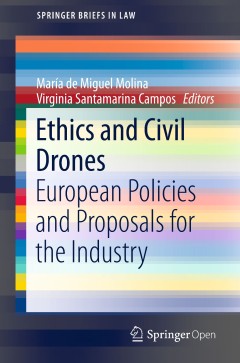
Ethics and civil drones : European policies and proposals for the industry
This open access book disseminates some of the results of the European H2020 AiRT Project (Technology transfer of RPAs for the creative industry). In particular, it presents findings related to mitigating safety and security concerns when civil drones are piloted by the service sector (mainly, the creative industry). European policies regarding drones generally focus on outdoor drones, but they…
- Edition
- -
- ISBN/ISSN
- 9783319710877
- Collation
- x, 92p. : ill.
- Series Title
- -
- Call Number
- 341.2422 ETH e
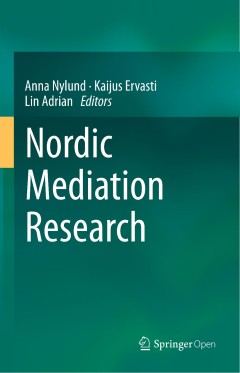
Nordic mediation research
This open access book presents twelve unique studies on mediation from researchers in Denmark, Finland, Norway and Sweden, respectively. Each study highlights important aspects of mediation, including the role of children in family mediation, the evolution and ambivalent application of restorative justice in the Nordic countries, the confusion of roles in court-connected mediation, and the chal…
- Edition
- -
- ISBN/ISSN
- 9783319730196
- Collation
- x, 269p. : ill.
- Series Title
- -
- Call Number
- 347.09 NOR n
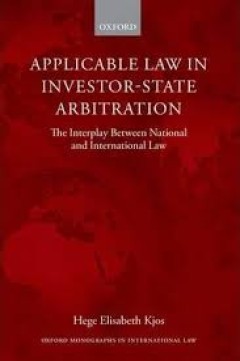
Applicable law in investor-state arbitration
This book examines the law, national and/or international, that arbitral tribunals apply on the merits to settle disputes between foreign investors and host states. In light of the freedom that the disputing parties and the arbitrators have when designating the applicable law, and because of the hybrid nature of legal relationship between investors and states, there is significant interplay bet…
- Edition
- -
- ISBN/ISSN
- 9780199656950
- Collation
- -
- Series Title
- -
- Call Number
- 346.092 ELI a
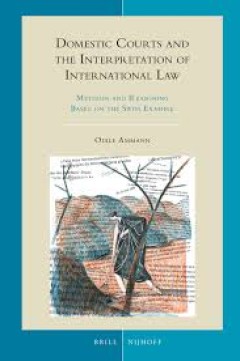
Domestic courts and the Interpretation of International law: Methods and Reas…
In Domestic Courts and the Interpretation of International Law, Odile Ammann examines the methodology and reasoning which domestic courts, including Swiss courts, use to interpret international law. She argues that interpretative methods must be taken more seriously in international law. Readership: Domestic judges, academics working on international law, legal theory, and judicial reasoning, a…
- Edition
- -
- ISBN/ISSN
- 9789004409873
- Collation
- -
- Series Title
- -
- Call Number
- 340 AMM d
 Computer Science, Information & General Works
Computer Science, Information & General Works  Philosophy & Psychology
Philosophy & Psychology  Religion
Religion  Social Sciences
Social Sciences  Language
Language  Pure Science
Pure Science  Applied Sciences
Applied Sciences  Art & Recreation
Art & Recreation  Literature
Literature  History & Geography
History & Geography